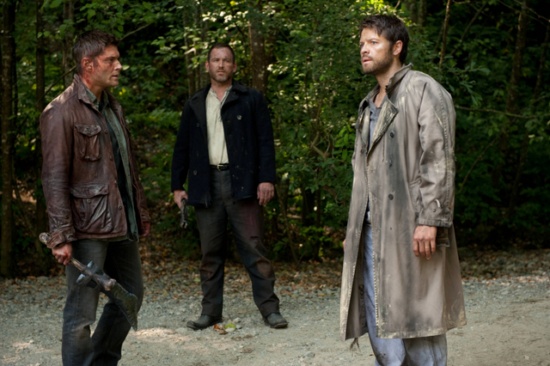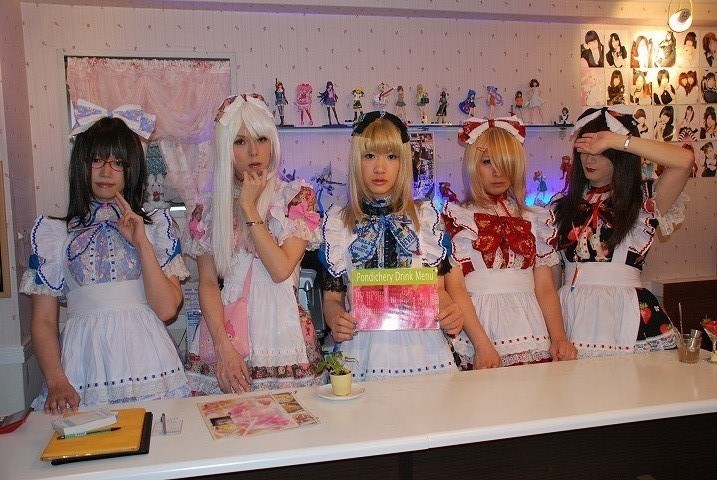The Bagel Head
This week I bring you yet one more strange thing the Japanese are doing in the name of fashion - the process of putting stuff into the skin of their head to make it look like a donut has been inflated there. It’s tentatively called “Bagel Head” and it seems to have gotten a permanent place in the underground body modification scene.
The process involves inserting a needle into the skin of the forehead and pumping about 400 cc of saline into it. This swells the skin into a mound-like form, a lump that looks like some sort of strange tumor. The procedure finalizes when the person performing it presses their thumb into the bulge to create the bagel shape that gives the modification its name.
Though bagels are the most popular shape, other people choose other designs, such as having the procedure done on either side of the forehead. Generally, it’s just a forehead shaping process that can be manipulated in a variety of ways to achieve different results.
The man responsible for popularizing the Bagel Head is Ryoichi Maeda. According to him, it has become a trend because people in the body mod scene are always looking for something new and original to do to themselves. When one thing becomes too wide-spread, they reach for the next. And the “next” at this time happens to be saline in the forehead skin.
Bagel Head wears off in less than 24 hours, the body absorbing the saline naturally, so it’s not something that you’d have to live with for a long time. It takes about two hours to get done and Ryoichi says that people usually only get the procedure done before certain events, such as body mod gatherings.
I’ve found a wonderfully disturbing video that shows the Bagel Heads being made. Watch it below, if you dare.
Manageable Third Downs
.
Brian Burke asks a first-grade question that, in 30+ years of watching the NFL, I'd never even considered. Is a team better off playing to create "manageable third downs," or is it better off just using its 1st and 2nd downs to avoid as many third downs as possible?
This question reminds me of when Bill James asked, "Do Rickey Henderson's 130 stolen bases really matter?," and revolutionized the way in which "speed" was prioritized in the game of baseball.
A stolen base causes an amount of psychological pain, or pleasure, that is far out of proportion to its actual impact. This is a case in which our human intuition lets us down.
And why would our intuition tell us that something is important when it's not? Part of the answer is that we invest in the outcome. Two or three tosses over to first base do indeed drive the runner's success rate way down. Sometimes there are things you have to invest in, that don't give you much reward for your trouble. For me, that includes mowing the lawn and weeding. I take an hour or two doing it, and I don't care enough about it to get any satisfaction out of it ... but now that I've spent time on it, I don't want a doggy coming over and messing it up.
NFL coaches in the 1970's thought about little else, it seemed, other than The Big War to stay out of third-and-longs. 3rd and 8 is a down on which the defense puts on a Cheshire-Cat Grin, and all of a sudden the other team is the bully and you're the nerd. Coaches hate that. (Maybe this is a human factor that is not captured by Burke's fine analysis: set the other team up to "bully" you on 3rd and 8's and the psychological war will slip away from you.)
.
=== Patriots, Seahawks ===
Supposing we grant Burke's premise, that teams should just treat each down as an isolated chance to move the chains. If this were generally true, it would be more true for some teams than others. It is generally true that baseball teams should use strikeout pitchers, not groundball pitchers. But that principle can be warped if you're in a huge stadium.
The Seahawks might be a team that does need to stick to the old "Manageable Third Down" paradigm, because (1) they've got Lynch to convert them, (2) they can't throw for 12 yards on first down very well, and (3) they don't want Russell Wilson facing a series of 3rd-and-longs.
The Patriots, if any team ever could, would be a team that could ignore the "Manageable Third Down" paradigm. For Brady, Gronk, Welker & Co. to treat its downs as three separate chances to torch a defense ... well, sure.
.
=== Audibles and Check-Downs ===
The Patriots have been my family's #2 team for a long time. We love watching Tom Brady stand there and point at defenders, calling out the blocking schemes, checking down to backup plays.
Sunday, he won't be able to set detailed blocking schemes at the line of scrimmage, ever. (Can you check down to a backup play with hand signals? Do the guards and tackles, who can't see the hand signals, just block the same way on a backup play?)
Does that mean that the Patriots' entire system is exceptionally vulnerable to CLink? Or does it mean that Brady's checkdowns have never been anything other than grandstanding?
.
Are reboots necessary?
It's no secret that repetition is a big part of Hollywood. When something goes good, they capitalize on it and soon the theaters, DVDs and streaming sites are filled with the same genre. Their idea is that if it worked once, then it will work again.
That's why when Twilight became popular, there was a sudden resurgence of vampire movies and television shows. This also goes true for movies that were hugely popular long ago and are now getting a facelift through reboots. Many of these movies that are getting reboots are modern day classics.
The Thing was a 1982 horror classic starring Kurt Russell. It didn't have the best special effects because it didn't have all the computer technology that we have today. It was all about latex, pulleys and wires.
In 2011, the movie was rebooted for modern audiences and it was horrible. I guess for audiences that had never seen the original, the reboot was good. As someone that grew up watching the original on everything from VHS to late night cable, the reboot was a pale comparison to the original. I guess not all movies suffer from a reboot, but many times purists can stand people trying to mess with perfection.
For people like me, the originals were good enough. I can watch The Thing and still love it for what it is: a good story. A reboot tends to take what's popular today and force it into the movie. There's more blood, more guns, more bang, but the story is lost.
It's Halloween: Just in time for Resident Evil
There are few games that will give you heebie jeebies more than Resident Evil. I grew up playing the original games on PlayStation and love the movies. Through the years, there have been good games and not-so-good games in the series.
I think that everyone will agree that Halloween is the perfect time to release a Resident Evil game. The past decade has become a zombie mecca with countless games, books and movies about the shambling corpses. Resident Evil is a big reason why that zombie resurgence happened. The movies were a major successes in the theater and the games have a strong following.
That brings us to Resident Evil 6. Perhaps the biggest departure from previous games is the divergent storyline. You're not just playing a few characters in a single building or city. You're playing characters in different parts of the world and their stories are all connected.
This game is more like an interactive movie as you find out what Umbrella is up to and then play as different character in a different place and find out more. Only you can put all the pieces together because the other characters are unaware of each other.
There is a lot riding on this game. Reviewers already consider it a success even if they haven't played through the whole game. I am looking forward to it, but with all the hype I am afraid it's going to disappoint because they have raised the bar so high.
Taking out your frustrations
A blog is supposed to be a place where you can tell people about your life and give your opinion regardless of what it is. There are many times in a marriage and parenthood when things aren't going great.
It could be stress, money or a millions of different things that culminate in short fuses and mean words. You may be tempted to share these on your blog. It's a great way to get things off your chest and odds are you probably find support from other in the same situation.
Don't! When your wife makes you mad, is always in a bad mood or even insults you in a horrible way, don't air your grievances on your blog. Odds are in a day or two whatever you were made about has blown over and you've move on to the next big crisis.
If you have a blog post up about it and she sees it, then you're going to be in a heap of trouble and not only have you brought that argument back to the surface, but also added an entirely new dimension. Many times people say marriage is about compromise, but in reality it about just making it through day by day.
You're going to have good days, bad days, good weeks and bad weeks. Live for the good times and try to put the bad ones behind you. Blogging about will only cause further animosity down the line. When it comes to airing your familial frustration, keep your mouth shut.
Yes, it's getting better
I knew things were going to be awesome when they played FBI agents and identified themselves as Sixx and Neil. That was a sign to the fans that things were getting back to normal in the Supernatural universe.
It was a nod to naming themselves after classic rock band members, but that practice was curtailed after the Leviathans made them public enemy number 1. Last season, everything changed and no one liked it. They killed off Bobby, they made Cas crazy and there were so many lame “Dick” jokes that you wanted to change the channel.
This episode brought back everything that made Supernatural great. The humor. The in-jokes. The premise was that Plutus, a god, was auctioning off the demon tablet to the highest bidder. Dean, Sam, Kevin and his mom visit it with the goal of winning or taking it. Crowley was also there, as well as an angel.
Needless to day, things don't quite go as well as planned and Crowley ends up with the tablet, but not Kevin. Kevin jumps ship afraid that Dean will end up getting him killed. We saw a few more flashbacks of Purgatory and finally saw Cas. Cas disappeared after they arrived and has been dealing with the baddies.
We don't know what ends up happening to Cas, but it's not going to be good that's for sure. Next week, we are going to see what Sam did and what his normal life was like.
Japanese cross-dressing maid cafes
Themed cafes are a very popular way to do business in Japan. With so many competitors, especially in the bigger cities, one has to be able to set themselves apart from the pack and encourage people to eat at their establishment instead of somewhere else.
Maid cafes are one way that people have been doing this for years. The waitresses all dress up in maid costumes and present food to the customers with an air of respect and submission. A newer development, however, has men dressing up in the maid outfits instead of women, and it’s become pretty popular in a relatively short period of time.
The first of these male-maid cafes was named Hibaritei and it was located in the Akihabara district of Tokyo. At first it was just a “floating” café, setting up shop in various locations to act as a unique form of entertainment for certain events. Over time, however, the idea caught on. Hibaritei created a trend that was imitated by many others and is now a staple part of the maid café culture.
The idea of being served by a cross-dressing man may seem rather odd to some, but the truth is that cross-dressing is becoming more popular in Japan. It is also becoming more accepted among the general populace.
This had lead to a proliferation of men dressing up as women and thus a demand from people to be served by these individuals. There is even an industry springing up around the idea of male-to-female cross-dressing, complete with guides and books to teach people how to do it properly and specialty clothing that helps the process.
Male maid cafes are yet another uniquely Japanese business trend and one that isn’t likely to catch on in other places too soon. If you’re in Tokyo and want to experience a different side of the restaurant culture, visit Akihabara and check out the Hibaritei Café or one of the others.
How much editing do you need to do?
Anyone who is a writer knows that being a writer and being an editor are two completely different things. A writer is someone that can take a thought and turn into a magical prose that drives people to read on. They can turn words into an emotional connection.
An editor is someone that knows grammar like the back of their hand and can take existing copy and perfect it. They are often mutually exclusive. I admit that my grammar skills are atrocious even after more than a decade of constant writing. Luckily, I married an editor. Together, we make the perfect team.
The question is what do agents and publishers expect when they finally see that finished manuscript? Do they want perfection? Yes and no. When you send in a final manuscript for them to see, it has to be polished to the best of your ability. That means going over every word over and over again until you think it's the best you can do. You might even want to pay an editor to go over it for grammar.
A publisher and agent would love to see a finished product that doesn't need any changes, but those are rare. A book that doesn't need a good once over by a professional editor is rare. Your book should be grammatically correct. Nothing makes an agent or publisher mad faster than sloppy copy. Plot and structure edits are common, but grammar edits are a death knell for a writer.
Modern Toilet Restaurant
Food and toilets: not usually two things that appear in the same place at the same time. In fact, aside from the eventual end of the digestive system (or the occasional bout of heavy drinking) food doesn’t get too intimate with toilets. But someone decided that it was a good idea to mix the two and ended up with a restaurant that has become wildly popular in Taiwan.
The name of the place is Modern Toilet Restaurant and its flagship store is located in Taipei. It opened in May of 2004, a strange and ambitious project by businessman Eric Wang. Upon discovering that people would pay more for chocolate ice cream cones that resembled poo, he took the idea a bit further and themed an entire restaurant off of bathrooms and bathroom-related activities. The end result was an instant hit and since 2004 more than a dozen other locations have been opened across Taiwan.
When eating at Modern Toilet, you will find your food served to you in either toilet-shaped dishes or bedpans. The seats are all toilets and the tables made from either bathtubs or sinks with glass plates placed over them. The ice cream is, just like Wang’s experiment, made to look like swirling poo. The rest of the décor consists of urinals and faucets redesigned to become the restaurant’s lighting system and variety of other bathroom items. It’s like a TGI Friday’s for those with a restroom fetish.
The food is said to be great, despite the rather odd presentational technique. If you happen to be in Taiwan, look for one of these novelty restaurants and try it for yourself. You never know, it might prove to be an enlightening eating experience. Or you just might be so turned off that you don’t eat a single bite.
Atlas Shrugged: Corporations thrive, people do not
I just saw the preview for “Atlas Shrugged.” Now I’m understanding why Paul Ryan has been talking up the novel “Atlas Shrugged,” which is Ayn Rand’s version of the world if corporations were to take power.
Corporate power has long been the dream of many American corporations. And many corporations are in fact ethical and set higher standards for themselves than the government regulators would. Corporations need regulation, just the same way that individuals need laws.
Let’s be realistic about corporations. If the head of a corporation has a choice to take a large bonus or disperse the amount more evenly to some of his senior employees, which decision will he make? Obviously, he or she would try to put the money in her own pocket, even if he did not do all of the work necessary.
In Paul Ryan’s version of the world, this is no problem, even though the head of the corporation is just assuming that he or she is ENTITLED to take the bonus because he or she is the head of the corporation. In Paul Ryan’s world, it is perfectly acceptable for the heads of corporations to TAKE MONEY from the shareholders who used their hard-earned daughters to invest in the company.
Corporate taking is allowable in Paul Ryan’s Ayn Rand-inspired world. Corporations would not have to pay taxes at all in his world. The rich, as Paul Ryan reminded us in the debate, should not be required to pay even more taxes because they pay so much already. It’s almost as if the rich think they are ENTITLED to an excessive amount of tax breaks that ordinary Americans either don’t know about or don’t have to worry about.
A corporation has one clear objective in most cases: to make money. If corporations can make more money by lowering wages or laying off workers, the head of the corporation will probably make that choice. The idea that deregulating corporations will result in more jobs or a better economy is skewed toward the super-rich like Mitt Romney.
Paul Ryan’s idea that the cream of the crop will rise to the top and that everyone else should suffer mirrors his running mate’s, who once said that some people thought that were ENTITLED to food.
Don’t be fooled by the blockbuster movie that is about to come out. Listen to the words coming out of Mitt Romney and Paul Ryan’s mouths and understand that the American people would not be represented by either of them.
Click HERE for another rant about the idiocy of Ayn Rand's theory of selfishness.













